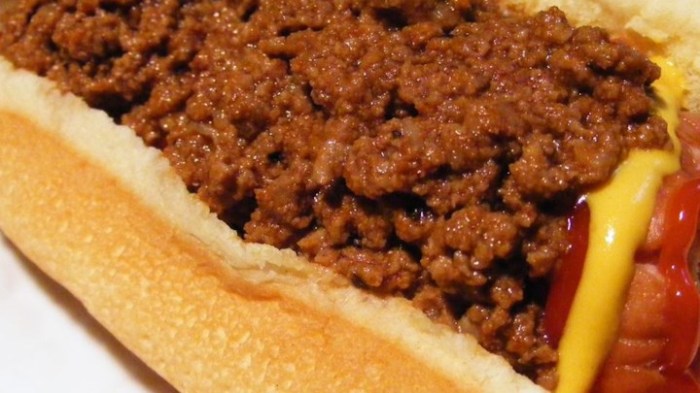Recipes for Hot Dog Sauce A Culinary Exploration
The World of Hot Dog Sauces

Source: persnicketyplates.com
Recipes for hot dog sauce – Hot dog sauces, seemingly simple condiments, hold a surprising depth of flavor, history, and cultural significance. From classic combinations to gourmet creations, the variations are endless, reflecting regional preferences and culinary innovation. This exploration delves into the popular trends, ingredient variations, preparation methods, serving suggestions, and nutritional considerations surrounding these beloved toppings.
Popularity and Trends of Hot Dog Sauce Recipes

Source: media-allrecipes.com
Online searches and recipe popularity metrics reveal consistent favorites and emerging trends in hot dog sauce recipes. While precise ranking fluctuates based on search engines and time of year, several recipes consistently top the charts. These recipes often build upon familiar flavor profiles, offering slight variations to cater to diverse palates.
| Rank | Recipe Name | Key Ingredients | Popularity Metric (Example) |
|---|---|---|---|
| 1 | Classic Chili Cheese Sauce | Ketchup, Chili, Cheddar Cheese, Worcestershire Sauce | 100,000 monthly searches |
| 2 | Sweet and Tangy Mustard Sauce | Yellow Mustard, Brown Sugar, Apple Cider Vinegar, Onion Powder | 75,000 monthly searches |
| 3 | Creamy Horseradish Sauce | Mayonnaise, Prepared Horseradish, Lemon Juice, Dill | 50,000 monthly searches |
| 4 | Spicy Chipotle Mayo | Mayonnaise, Chipotle Peppers in Adobo Sauce, Lime Juice, Garlic | 40,000 monthly searches |
| 5 | BBQ Bacon Sauce | Barbecue Sauce, Bacon Bits, Brown Sugar, Worcestershire Sauce | 35,000 monthly searches |
The flavor profiles range from the familiar tang of mustard-based sauces to the rich, savory depth of chili cheese and the smoky sweetness of BBQ bacon. Historically, hot dog sauces evolved from simple ketchup and mustard combinations to more complex recipes incorporating a wider array of ingredients, reflecting changing culinary trends and the availability of diverse spices and condiments.
Ingredient Variations in Hot Dog Sauces, Recipes for hot dog sauce
The versatility of hot dog sauces lies in the diverse range of ingredients that can be incorporated. Careful selection of each component significantly impacts the final flavor profile.
Many enjoy experimenting with different recipes for hot dog sauce, from classic chili to creamy cheese variations. For a unique twist, consider incorporating elements of a sweet and sour profile; a great starting point could be this recipe for sweet and sour sauce with pineapple juice , adapting the sweetness and acidity levels to suit your hot dog preferences.
The resulting sauce offers a delightful contrast to the savory hot dog, creating a memorable flavor experience.
Ketchup choices extend beyond basic varieties. Organic ketchups offer a natural alternative, while homemade versions allow for precise control over sweetness and acidity. Specific brands, known for their unique flavor profiles, can also be employed. Mustard plays a crucial role, with yellow mustard providing a classic tang, Dijon mustard adding a sharper, more complex flavor, and stone-ground mustard offering a rustic, coarse texture.
Relish adds a textural and flavor contrast. Sweet relish offers a sugary counterpoint, dill relish provides a briny, herbaceous note, and other variations, such as red onion or jalapeño relish, introduce spiciness or a more pungent flavor. Gourmet or regional variations often incorporate unique ingredients to create distinctive flavor profiles.
- Caramelized onions
- Roasted red peppers
- Pickled ginger
- Beer reduction
- Gochujang (Korean chili paste)
Preparation Methods and Techniques
Creating a hot dog sauce from scratch is surprisingly straightforward. Simple recipes emphasize ease of preparation and readily available ingredients.
A basic hot dog sauce can be made by combining ketchup, mustard, and relish in a bowl, adjusting proportions to taste. More complex sauces might involve cooking ingredients on the stovetop to meld flavors or using a slow cooker for a low-and-slow approach, which intensifies the flavors. Stovetop methods allow for immediate adjustments, while slow cookers offer convenience.
Spicy Hot Dog Sauce Recipe:
Ingredients: 1 cup ketchup, 1/4 cup sriracha, 2 tablespoons brown sugar, 1 tablespoon apple cider vinegar, 1 teaspoon smoked paprika, 1/2 teaspoon garlic powder.
Instructions: Combine all ingredients in a saucepan. Simmer over low heat for 10 minutes, stirring occasionally. Let cool slightly before serving.
Visually appealing presentation involves a generous, yet controlled application of sauce. Imagine a plump hot dog nestled in a toasted bun, glistening with a vibrant, richly colored sauce, perhaps with a sprinkle of fresh herbs or a scattering of finely chopped onions for added texture and visual interest. The sauce should coat the hot dog evenly, creating a mouthwatering display.
Serving Suggestions and Pairings
Serving hot dogs with different sauces opens up a world of culinary possibilities. Creative presentations and thoughtful pairings enhance the overall dining experience.
Hot dogs can be served in various ways: classic buns, pretzel rolls, or even lettuce wraps for a lower-carb option. Complementary side dishes vary depending on the sauce. Potato salad, coleslaw, or macaroni salad pair well with creamy or tangy sauces, while spicy sauces benefit from cooling sides like a fresh green salad or corn on the cob.
| Hot Dog Type | Recommended Sauce |
|---|---|
| Beef Hot Dog | Classic Chili Cheese Sauce |
| Pork Hot Dog | Sweet and Tangy Mustard Sauce |
| Chicken Hot Dog | Spicy Chipotle Mayo |
The cultural significance of hot dogs and their sauces varies widely. In the United States, regional variations abound, reflecting diverse culinary influences. Internationally, hot dogs are adapted to local tastes, often incorporating unique sauces and toppings that reflect the culinary traditions of specific regions.
Nutritional Information and Health Considerations

Source: tasteofhome.com
Understanding the nutritional content of hot dog sauce ingredients is crucial for making informed choices. Many traditional recipes are high in sodium and sugar.
| Ingredient | Nutritional Value (Example) | Healthier Alternative |
|---|---|---|
| Ketchup | High in sugar and sodium | Homemade ketchup with reduced sugar |
| Mayonnaise | High in fat and calories | Greek yogurt |
| Processed Cheese | High in saturated fat and sodium | Reduced-fat cheese |
Reducing sodium can be achieved by using low-sodium ketchup and mustard, or by reducing the overall amount of salt added. Sugar content can be lowered by using less sugar or substituting with natural sweeteners like stevia or honey. Healthier alternatives, such as using Greek yogurt instead of mayonnaise, offer a way to create delicious and nutritious hot dog sauces.
Question & Answer Hub: Recipes For Hot Dog Sauce
Can I make hot dog sauce ahead of time?
Yes, most hot dog sauces can be made ahead of time and stored in the refrigerator for several days. This allows flavors to meld and develop.
What type of hot dog is best for spicy hot dog sauce?
A slightly milder hot dog, such as a beef frank, pairs well with a spicy sauce to balance the heat.
Are there vegan hot dog sauce options?
Absolutely! Use vegan ketchup, mustard, and relish to create a delicious plant-based sauce. Many recipes can be easily adapted.
How can I thicken my hot dog sauce?
A cornstarch slurry (cornstarch mixed with cold water) added to the simmering sauce will help thicken it to your desired consistency.













